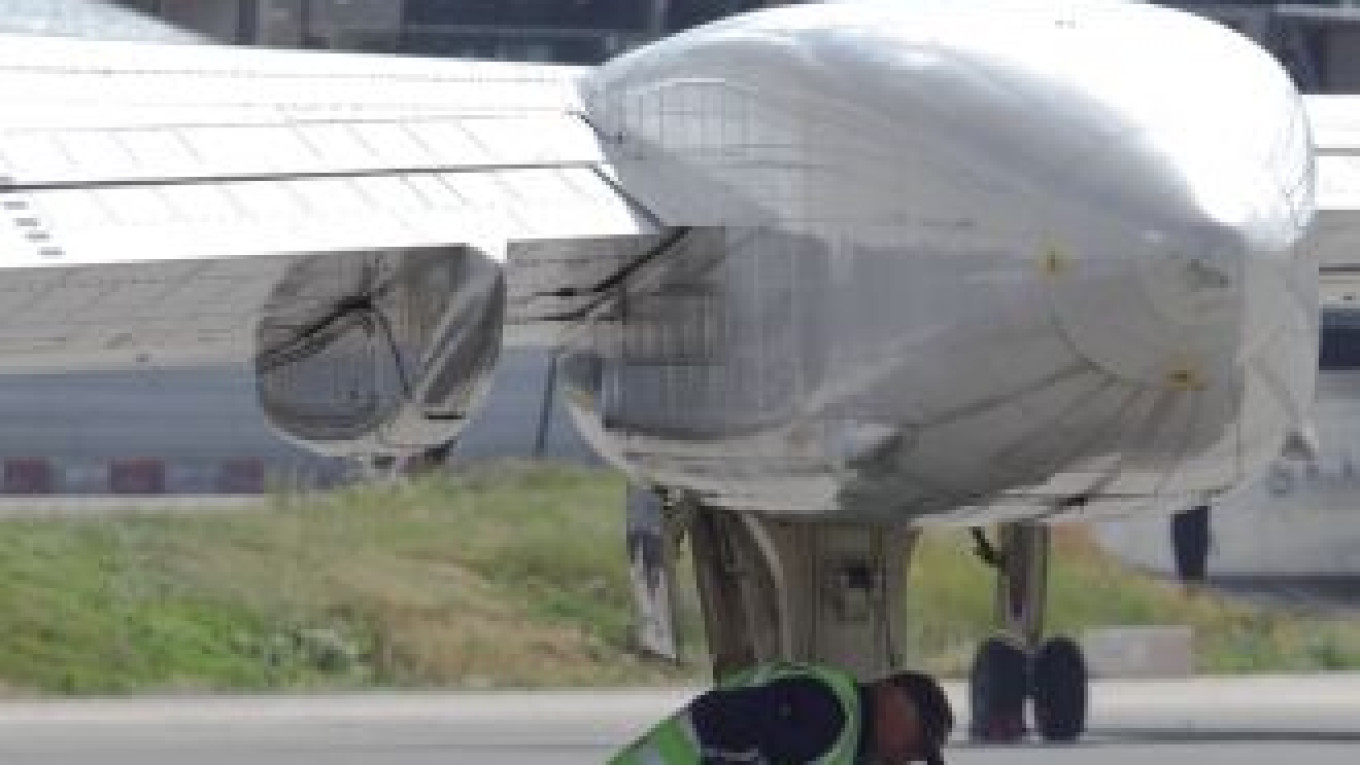A series of disasters in domestic aviation is the result of systemic shortcomings in the industry, and cutting the number of airlines will make no difference to safety without a fundamental cultural shift in the way business is done, a retired pilot has said.
? "If fewer airlines meant safer skies, the world would be a much simpler place than it is," Oleg Smirnov, chairman of the Federal Transport Agency's commission on civil aviation, said in reference to government plans to slash some of Russia's hundred-plus airlines.
Smirnov was speaking after the national air regulator withdrew operating licenses from three airlines and said that it was considering action against 30 more.
Federal Aviation Agency chief Alexander Neradkov refused to name the airlines concerned Wednesday, but said they had failed to live up to both safety and financial requirements.
Vedomosti, citing a source in the Transportation Ministry, later identified the unfortunate three as Ilin, the Ulyanovsk Higher Aviation School and Jetalliance Vostok, a subsidiary of Aeroflot and Austrian business-jet operator Jet Alliance.
President Dmitry Medvedev vowed Sunday to cut the number of airlines in the country, about 130 currently, in response to the Yaroslavl air disaster on Sept. 7 that killed 44 people, including most of Yaroslavl's Lokomotiv hockey team. It was the country's eighth deadly crash this year and brought total aviation fatalities this year to 119 — more than in any other country in the world.
Most of this year's air disasters can be attributed to small airlines or charter companies running fleets of three to six often aging planes on short regional routes.
"At this point, it's obvious that it is not a question of coincidence. This is a systemic problem," said Smirnov, a retired pilot.
"But the government shouldn't be reducing the number of airlines but changing the rules that allow you to set one up. The number of airlines is a matter for the market," he said.
"There are thousands — literally thousands — of airlines in the United States. And they fly more passengers per year than anyone," Smirnov said.
The United States suffered only 20 aviation fatalities in 2010, according to the Aviation Safety Database. Russia suffered 110 fatalities in the same year, the bulk of which were accounted for by the Polish Tupolev-154 that crashed in foggy conditions near Smolensk in April.
While declining to comment on the situation in Russia, one U.S. aviation professional concurred that "technology does not equal safety."
"The U.S. is lagging in air traffic control — we're using 1950s equipment and ground-based radar that means we have to fly these circuitous, occasionally inefficient routes — but it is safe," said Charles Duncan, United Airlines vice president for transatlantic, Middle East and India sales, in an interview with The Moscow Times.
The real problem is a misguided, laissez-faire policy of registration and approval that allows "almost anyone" to set up an airline extremely easily, Smirnov said.
He also blamed a culture that promotes profits over professionalism and a blurred hierarchy of responsibility that allows companies to pressure pilots not to abort flights.
"We need a clear 'road map' of responsibilities that will give pilots the authority to say 'guys, I've seen the situation, we're not flying,'" he said.
Industry analysts say consolidation of the market is already underway, and the government's moves will only speed the process.
But there is a fine line to be walked between safety and keeping the country open for business.
All eight fatal accidents in Russia this year have involved aging Antonov, Tupolev and Yak models, prompting a push to renew the national fleet.
But new Russian aircraft like the Sukhoi Superjet 100 are not being produced in large enough numbers to replace retired aircraft, and they are too big to be flown economically on routes currently serviced by the Yak-42, said one aviation analyst who asked not to be named because he was not authorized to speak to the press.
Nor are there any modern aircraft that are light or tough enough to replace the An-24, which is used to land on unpaved airstrips in remote regions of the Far North and East.
An An-24 crashed in June, killing seven. But getting rid of them, or the airlines that fly them, could isolate hundreds of communities without rail or road links, Smirnov warned.
A Message from The Moscow Times:
Dear readers,
We are facing unprecedented challenges. Russia's Prosecutor General's Office has designated The Moscow Times as an "undesirable" organization, criminalizing our work and putting our staff at risk of prosecution. This follows our earlier unjust labeling as a "foreign agent."
These actions are direct attempts to silence independent journalism in Russia. The authorities claim our work "discredits the decisions of the Russian leadership." We see things differently: we strive to provide accurate, unbiased reporting on Russia.
We, the journalists of The Moscow Times, refuse to be silenced. But to continue our work, we need your help.
Your support, no matter how small, makes a world of difference. If you can, please support us monthly starting from just $2. It's quick to set up, and every contribution makes a significant impact.
By supporting The Moscow Times, you're defending open, independent journalism in the face of repression. Thank you for standing with us.
Remind me later.


